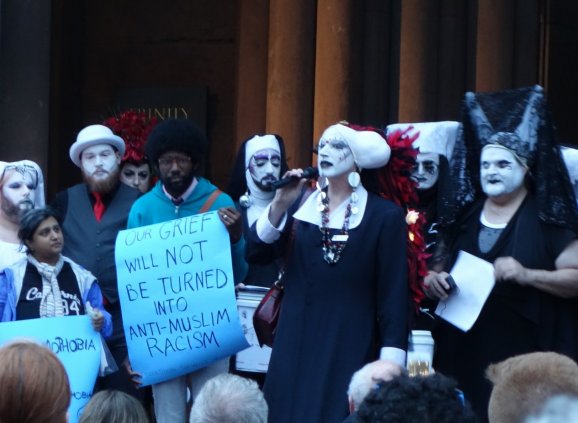
- Vested Interest
Standing on the Steps

I arrived home from the Parish Weekend on Sunday afternoon with sand between my toes, my Trinity name button still on, and ready to fall into bed for a well-earned nap. Instead, I idly scrolled through my Facebook feed—something I’d been avoiding in a half-hearted attempt to “unplug” from the world—and came upon that heartbreaking, dully familiar word cloud that tells me that another mass shooting is upon us: Victims. Shooting. Orlando. Suspect. Assault rifle. Thoughts and prayers. Tragic. Senseless. That afternoon, while the news narrative began to coalesce and Democrats and Republicans alike settled into their familiar battle lines, I found myself tangentially drawn into a string of text messages among my colleagues. The Boston Sisters of Perpetual Indulgence were planning a vigil in Copley Square at 8 p.m., and were interested in having Trinity’s support. Our clergy and staff—particularly Mark Kharas, who offered our support to the Sisters and coordinated Trinity’s involvement—swept into last-minute liturgical planning. And that night hundreds of grieving, angry, shocked people stood before the steps of the West Porch and reminded each other that they were loved, that they were united, that they were strong.
I’m thinking today about different spaces, different places for worship and prayer and community. I’m thinking about a couple of essays I’ve read on the dance club, and the ways it’s been a sanctuary and sacred space for queer folks, particularly queer people of color. I’m thinking, frankly, about all the people who’ve told me that they’ve been afraid to walk into Trinity, and all the snide comments I’ve heard from people who think of Trinity as a church that’s only for rich white straight folks. (It’s not, of course. I know it’s not, and you know it’s not. But there are plenty of people who still think that’s who we are.)
I’m thinking about the ways the architecture of Trinity expresses a certain kind of power—the power of the church—and about the people who’ve learned over and over again that this kind of power will always and forever be used to keep them silent. I’m thinking about the ways we as a community might need to subvert this power, and also about the ways we can use this power to connect and heal and serve. Bill Rich, our Vicar, began the day celebrating Eucharist next to a lake, with barefoot children peering over the altar at him. He ended it standing on the steps of Trinity Church, fully vested, handing the megaphone over to the sacred clowns of the LGBT community as they led the assembled crowd in lamentation and song. I’m thinking about what a powerful symbol that handoff made.
We have this building. We have this history. We have this space right in the center of things. For better or for worse, we have a certain kind of power and influence. I’m so proud that on Sunday we were able to use this influence to lift up and support the voices of the marginalized, the broken-hearted, those whose safe spaces are under attack. For my money, this is the only appropriate use of power by the church. Person by person, day by day, we must keep using our power in this way: giving it away, over and over, to those who need to be heard, who need to hear that they are loved, who need to have their lives treated as sacred, who need a safe place to be themselves. We must stand on the steps of the West Porch, not just inviting people inside to worship as we worship, but sharing the self-giving love of Jesus with everyone who’s too afraid to come inside, or who doesn’t know why they might want to. That’s how we can serve Jesus. And that’s also where we’ll find Him.
At "Vested Interest," church nerd Mary Davenport Davis explores all things liturgy and music at Trinity and beyond. Chime in with comments and questions!


Comments